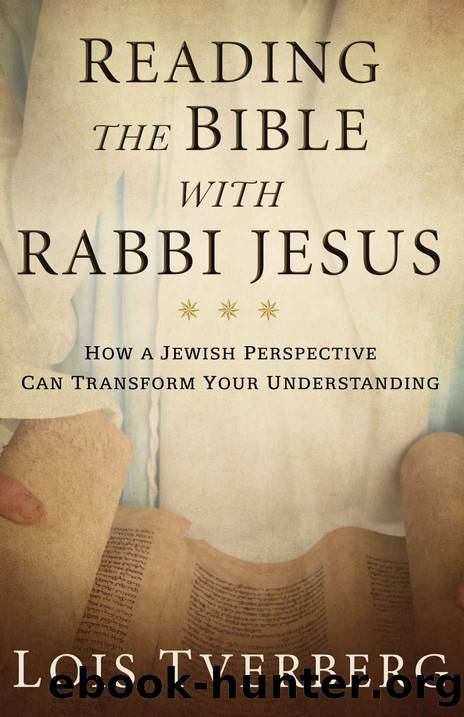Reading the Bible with Rabbi Jesus by Tverberg Lois

Author:Tverberg, Lois
Language: eng
Format: epub
Tags: Christian Living / Bible Study;Old Testament—Criticism | interpretation | etc.;Jewish;REL012120;REL006220;REL006210
ISBN: 9781493412679
Publisher: Baker Publishing Group
Published: 2018-01-01T16:00:00+00:00
The Merit of the Fathers
A related idea is that of zechut avot (ze-KHUT ah-VOTE), the “merit of the fathers,” that God would show special mercy toward the people of Israel because of the merits of their forefathers Abraham, Isaac, and Jacob.11 They see this as coming from God’s promises to the patriarchs, and because God told Moses that he would pardon to the thousandth generation those who love him (see Exod. 34:6–7). When Moses appealed to God to forgive the rebellious Israelites in the wilderness, he reminded God of his promise to his ancestors (Exod. 32:13; Deut. 9:27). In Micah 7, God’s mercy is also linked to his pledge to the patriarchs:
Who is a God like you,
who pardons sin and forgives the transgression
of the remnant of his inheritance?
You do not stay angry forever
but delight to show mercy.
You will again have compassion on us;
you will tread our sins underfoot
and hurl all our iniquities into the depths of the sea.
You will be faithful to Jacob,
and show love to Abraham,
as you pledged on oath to our ancestors
in days long ago. (Mic. 7:18–20 NIV)
Even Paul alludes to this idea in Romans 11:28–29: “but as far as election is concerned, they are loved on account of the patriarchs, for God’s gifts and his call are irrevocable” (NIV). John the Baptist, however, told his audience to repent and to not assume that the merit of their ancestors would be sufficient to pay for their sins: “Do not think you can say to yourselves, ‘We have Abraham as our father.’ I tell you that out of these stones God can raise up children for Abraham” (Matt. 3:9 NIV).
On Rosh Hashanah and Yom Kippur, when Jews pray for forgiveness for their sins, the focus is on the Akedah, the “Binding of Isaac,” the Genesis 22 account of Abraham’s willingness to sacrifice Isaac at God’s request. Remarkably, some traditional prayers ask for forgiveness for the sake of Abraham, who was a father who had such great love for God that he was willing to sacrifice his own son. Others even petition for mercy for the sake of Isaac, who offered himself up as a willing sacrifice! (They point out that if Isaac was carrying enough wood to burn a sacrifice, he had to be a grown man and easily able to overpower his elderly father. His willingness to be a sacrifice is seen as a prominent theme of the story.)12
While these prayers do not explicitly name Christ, they do show that the Jewish reading of the Hebrew Bible supports the idea that a sinner can seek forgiveness from God because of the righteous merits of another person.
Jesus’ first followers were well acquainted with the Hebrew Scriptures and their interpretation. They certainly knew that Isaiah spoke of one who would “[bear] the sin of many, and [make] intercession for the transgressors” (Isa. 53:12 NIV). They did not invent the idea that Jesus’ sacrifice would atone for the sins of those who believed in him. Rather, they saw that it was woven through their Scriptures from beginning to end.
Download
This site does not store any files on its server. We only index and link to content provided by other sites. Please contact the content providers to delete copyright contents if any and email us, we'll remove relevant links or contents immediately.
Hebrews, James by George H. Guthrie & George H. Guthrie(449)
Israel: Ancient Kingdom or Late Invention? by Daniel I. Block(439)
Ideology by Eagleton Terry;(437)
The 9.9 Percent by Matthew Stewart(416)
The New Oxford Annotated Bible with Apocrypha by unknow(407)
Take Back Your Time by Christy Wright(406)
Eating the Bible by Rena Rossner(403)
Insights on Hebrews by Charles R. Swindoll(396)
The Book Every Leader Needs to Read by 48 Authors(394)
Psalms, Proverbs, Ecclesiastes, and Song of Songs by John W. Hilber & Tremper Longman III & Duane Garrett(369)
Commentary on the Torah by Richard Elliott Friedman(343)
Commentary on James (Commentary on the New Testament Book #16) by Robert H. Gundry(341)
Judges: Volume Two by unknow(336)
The Jew in the Lotus by Rodger Kamenetz(335)
Who Wrote the Bible? by Richard Elliott Friedman(333)
NKJV, Ignite, eBook by Thomas Nelson(330)
Job, Ecclesiastes, Song of Songs by August H. Konkel & Tremper Longman III(326)
Proverbs, Ecclesiastes, Song of Solomon (Ancient Christian Commentary on Scripture) by J. Robert Wright(322)
Reading the Bible with Rabbi Jesus by Tverberg Lois(305)
